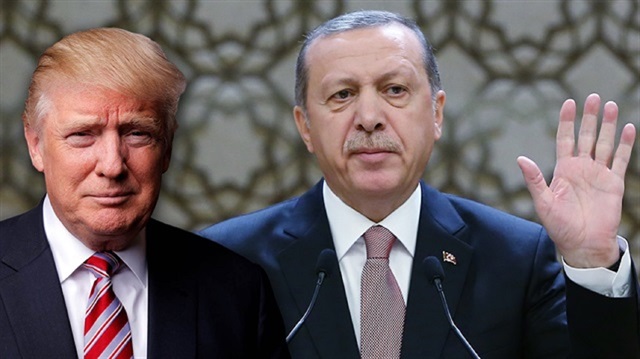
U.S. President Donald Trump's attack on Syrian military facilities with Tomahawk cruise missiles represents a modest re-assertion of American presence in the region. His predecessor Barack Obama had done everything possible to diminish U.S. power and prestige. Although Trump has little professional experience in politics, he has great experience in negotiating and timing, as well as in media relations, which transfer to public diplomacy.
He succeeded in isolating Russia in the U.N. Security Council, when China failed to veto the resolution condemning the Syrian government's use of gas. His strike against Syria was a message not only to North Korea but also to Iran. Such events, all happening in Ankara's extended neighborhood, have significant implications for Turkey's international policy. The developments represent first of all a closer alignment of U.S. and Turkish policies, despite disagreements over some details.
Russia, despite its veto of the U.N. resolution condemning Syria, recently indicated yet again that it does not regard Bashar al-Assad's political rule as an absolutely necessary condition for a settlement of the civil war, even if it will not assist in removing him. The question of Assad is key for Turkey because this question divides Russia and Iran. Russia wishes only for its own, newly asserted military interests in the region to be guaranteed. (Some specialists even speculate that the Russian military operates there, independent of Putin's direction.) The Kremlin does not necessarily wish to direct events completely, but it wishes to be able to veto any development. As with Cyprus, Russia would prefer that no decision can be implemented without its agreement, although Russia's claims about Cyprus are more difficult to sustain than those about Syria.
It is in Turkey's interest to find an alternative to Assad, because Assad is the creature of Teheran. Iran is concerned only to continue to disrupt any existing balance in the greater region. It is well known, for example, that Iran has begun to engage in population transfers of Shi'a from Pakistan and Afghanistan into Iraq and Syria. Not to mention this is a violation of international law, Turkey has some historical experience about how disruptive mass population transfers can be.
Iran's revisionism (i.e. its drive to overturn the international order at last in its own region) is aided and abetted by Russia and China, but it is driven by the state's own millenarian ideology. One used to be able to refer to the imperial pretensions of the regime in power as "Safavid revisionism" but the theocracy's geopolitical claims have for some time gone far beyond those of the Safavid Empire.
The extension of Persian influence into Syria, Lebanon, and the Gaza Strip is a vital threat to Turkish interests, because it lays the groundwork for the assertion of hegemony over regions of eastern and southeastern Turkey that were part of the Safavid Empire under Shah Ismail I in the early sixteenth century.
The Ottoman Empire's occupation of part of the territory of today's Iran is likewise part of the reason why Teheran will be fundamentally and existentially hostile to Ankara, despite any economic cooperation. Even improved relations between Azerbaijan and Iran will not alter Teheran's attitude toward the Republic of Turkey.
The problem for Ankara is that it needs a stable regional neighborhood, but Iran sees its own interest in chaotic instability. Russia and China are complicit in this design, because they see it as a means to diminish still further American power and prestige.
The Trump Administration, however, is reversing Obama's course.
The Tomahawk missile strike against Syria was a warning to North Korea, and the use of the "Mother Of All Bombs" against the Daesh headquarters underground in Afghanistan is recognized as a warning against Iran's multiple and self-declared violations of the Joint Comprehensive Plan of Action (JCPOA) concerning its nuclear weapons development program.
Turkey needs to cooperate with the West, because Russia and China will always prefer Iran over Turkey. Turkey's geographical neighborhood will not move, but the country needs to reach out beyond it, in order to secure support in all possible directions. Recent moves to improve relations with Israel and even Egypt are positive developments, and these should go further if circumstances permit.
One easy confidence-building measure would be to cooperate with the United States over Cyprus. Cyprus's geopolitical location remains important to all players. The U.S. has not yet been directly involved in the Cyprus negotiations, but it would be easy for them to begin to play a supporting role. Secretary of State Rex Tillerson's background in the energy industry would enable him to help that important cooperation portfolio to make progress.
President Trump's interest in high-profile successes makes it possible for President Erdoğan to establish good personal and political relations with him through a prosperous resolution of the Cyprus issues. Although Trump really is separated now from his business interests (if for no reason other than lack of time), rebuilding Varosha could be a "flagship" project for bilateral cooperation with or without his organization's participation.
Both Turkey and the U.S. have an interest in the stability and prosperity of the Eastern Mediterranean. It could be argued that neither Russia, China, nor Iran has as strong an interest in this, as do Turkey and the U.S. All that is remains is to overcome the political risk that has blocked investment and development for the last several decades.
If the U.S. took the lead, the EU would be unable to object. But given the new "America First" policy, the U.S. will not take the lead unless it believes that this is in its own national interest. Ankara has the chance to demonstrate leadership on the Cyprus settlement and can produce arguments that will convince Washington about this. Yet the window of opportunity for this will not remain open for long.














